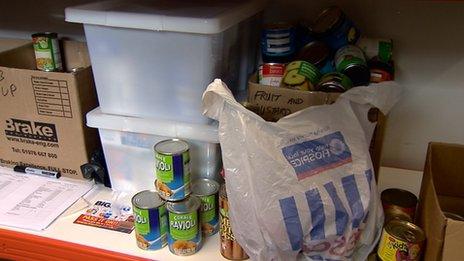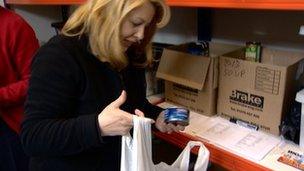More people turning to food banks
- Published

About 6,000 people in Scotland used food banks last year
A record number of people are turning to charities to help them feed their families.
The Trussell Trust, which runs the UK's only network of food banks, fed almost 129,000 people last year, including 6,000 in Scotland.
The food bank gives people referred to it an emergency supply of dried and tinned food.
However, some charities are concerned that charities are being used as a replacement for government action.
According to the Office for National Statistics, food and soft drink prices rose by 4.6% in the year to March, but for many people benefits and wages are not going up, leaving less money for food.
Very reluctant
Captain Stephen Turner, who works for the Salvation Army from Hawick in the Borders, said he was particularly concerned by the number of pensioners approaching them.
He said: "The most recent thing, and it's very unusual in my 15 years of experience, is that actually we've had requests from older people on pensions who are just beginning to struggle with day-to-day living.
"That is unusual because they tend to be proud and very reluctant to ask for help, so if they are asking they are probably in serious financial difficulty."
There are more than 200 Trussell Trust food banks in the UK, 10 of which are in Scotland.
The food bank system works on a referral-only basis.
Every client is sent to the food bank after concerns raised by health visitors, doctors, social workers, and other professionals and social organisations.
They are given an emergency supply of food which should last them for at least three days.

The food banks are run by volunteers
Barbara Hill and her daughter Beckie sought the help of the Dundee food bank in January after Barbara's husband Steve became too sick to work as a security guard.
Beckie's two-year-old son also lives with the family.
She said: "I'm lucky if I have £100 to spend on food and nappies, everything we need at the end of the month.
"If we didn't have the little man living with us I don't think we would have got in contact with the food bank, but you can't make him go on one meal a day, whereas me, my daughter and my husband can."
But critics have expressed concern about the food bank system, saying that it masks the true extent of poverty.
Extremely difficult
Hannah Lambie-Mumford, from Sheffield University, has researched the development of food banks in the UK.
She said: "My research has found food parcel recipients, whilst grateful for the generosity, love, care and support they receive at a food bank, they find the reality of having to seek assistance in the first place, having to ask for help, is extremely difficult.
"A number of people relayed to me very moving stories about the experience of humiliation, a sense that people were having somehow to beg for receipt of this charity."
John Dickie, from the Children's Poverty Action Group in Scotland, said: "We would be deeply concerned if it was ever seen that charities, food banks, would in any way be a kind of replacement for a tax and benefit policy that ensures all our families have adequate incomes for the task of bringing up their children.
"This is an indictment of government policy and shouldn't be seen as an alternative to the kind of national action we need to prevent children and families living in poverty in the first place."
<link> <caption>BBC Scotland Investigates: Breadline Scotland transmits on Sunday 29 April at 16:32 on BBC Radio Scotland</caption> <url href="http://www.bbc.co.uk/programmes/b01gw2vv" platform="highweb"/> </link>
- Published28 April 2012
- Published28 April 2012